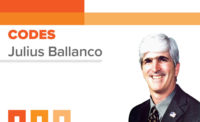The smarter we get, the stupider we become. I have been hearing that expression more often in reference to the COVID-19 vaccination. There are people actually considering not getting vaccinated. After receiving my second Pfizer shot, I felt a burden lift off my shoulders. I felt protected again. Maybe in the future, we can even have in-person meetings! If you have not already, please get vaccinated.
I have often said that this same expression can be used when listening to discussions at code change hearings. Sometimes you just shake your head with the comments from the Code Committees.
ICC held its very first virtual code change hearings in April and May. Let us hope it is the last time they hold them virtually. While technology has advanced, I think everyone got tired of the statement, “Can you hear me now?”
To say the virtual hearings were slow is an understatement. The hearings dragged on, proceeding at less than half the speed of in-person hearings. What was difficult to control was “me too” testimony on code changes. When in-person, if someone testified on issues you considered raising, you just sat down and did not testify. It was called the “Me too wave.” Online, once you were in the queue, you were called to the floor. Your only choice was to say, “Me too.” Of course, that added unnecessary time to the hearings.
Another missing component was the back-room dealings. At in-person hearings, there is a lot that goes on behind-the-scenes, which helps to expedite and consolidate code proposals. With no back room, this could not be done.
Hearing recap
The Plumbing Code hearings began on a Sunday afternoon. This was the first year for the new chair of the Committee, and he did an excellent job. While the Plumbing Code Committee made some very good decisions, they also made several bad decisions.
It is a bad idea to start a committee hearing with complex technical changes at the very beginning. That is what occurred when the code change regarding fixture unit values for bathroom groups was the second to be heard. I submitted the change to allow the International Plumbing Code to consider the research done by Tom Konen in the 1990s. When submitting a code change, you can include a bibliography of supporting documents. For this code change, the Konen paper published by ASPE was included.
Rather than discussing technical merits, the Committee reverted to not liking the way it was worded, and found nitpicking reasons for rejecting the code change.
This started a continuous nitpicking of words in almost every code change that followed. If the words were not perfect, the code change was going to be denied. During one code change proposal, it was stated that the Committee did not like the term, “all gender” to describe a toilet room. They prefer “all persons, regardless of sex.” Isn’t that the same thing? Isn’t “all gender” the more politically correct term? The code change was denied.
One of the more contentious code changes was regarding shower flow rates. NRDC had a proposal to lower the flow rates for showerheads from 2.5 gpm to 2.0 gpm. After a long back-and-forth debate, the code change ended in a tie. The chair ruled in favor of the code change, thus the Committee recommended approval of 2.0 gpm for showerheads. The following day, the same code change was presented to the International Residential Code Plumbing Section. That Committee voted unanimously to disapprove the lowering of the showerhead
The code change that would mandate soap dispensers for public lavatories was approved following a modification. The modification clarified that the requirement does not mean one soap dispenser per lavatory. There can be one dispenser serving multiple lavatories. This will be the first time soap is mandated. COVID-19 raised the issue that soap was never included as a requirement in the Plumbing Code.
There were a series of proposed changes from ASSE, removing ASSE 1082 and replacing it with ASSE 1084. One standard is for a centralized water heater (ASSE 1082), while the other is for a point of use water heater (ASSE 1084). The Committee grilled the proponent as to why it wanted to eliminate ASSE 1082. There was no good answer, so the Committee modified the change by simply adding ASSE 1084 while keeping ASSE 1082.
One change proposed to mandate food waste disposers in commercial kitchens discharge through the grease interceptor. The justification for the change was minimal, basically saying there is grease in the food waste disposer. While it was a nice statement, code changes during previous cycles included research showing why such a practice is not current. The Committee denied the code change.
The Committee did approve a number of changes related to well systems. However, one proposed change was expanded to address all potable water tanks. The Committee pointed out that the standard only addresses one type of tank normally associated with well systems. Yet, the code change would have the requirement apply to all potable water tanks. That change was not approved.
The health care industry tried to add a section to the code that would allow handwashing stations in health care facilities to have only cold water. The wording was so confusing, it was difficult to make out what the change was requiring. When it was pointed out that people in Northern climates, such as Chicago or Detroit, don’t wash their hands when the water temperature is 45° F in the winter, the Committee unanimously rejected the code change.
The results of the code changes are available on the ICC website, ICCsafe.org. Public Comments to the code changes are due on July 2. ICC has announced the final hearings will be held in person in Pittsburgh at the end of September. This will be the first gathering of a code change meeting since the COVID-19 pandemic started.
The views expressed here are strictly those of the author and do not necessarily represent PM Engineer or BNP Media.


